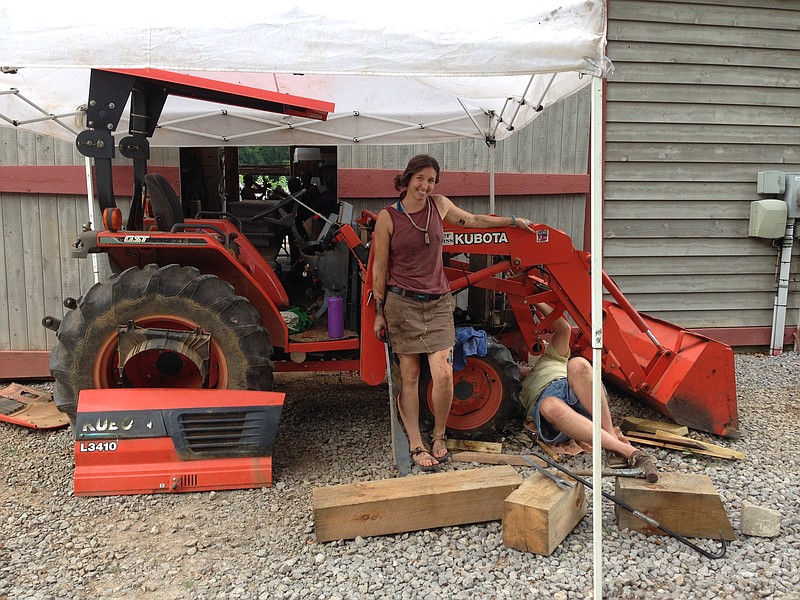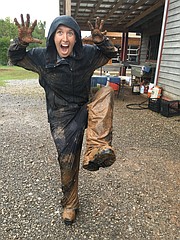Chattanooga’s Community Farm
Tucked in an unassuming neighborhood alongside Rossville Boulevard, Crabtree Farms is a 22-acre working farm that prides itself on sustainability. For example, it uses “green manure” to fertilize plots between seasons. Green manure is the practice of planting cover crops such as ryegrass, winter wheat or red clover — plants that are eventually plowed back into the soil as nutrients.The crops harvested include tomatoes, okra, berries, leafy greens, carrots, peppers, squash, potatoes, herbs and more. In addition to fruits and veggies — all started from seed — Crabtree grows shiitake mushrooms and raises bees.Throughout the year, you can sample Crabtree’s farm-fresh fare in the following ways:» At Main Street Farmers Market, 325 E. Main St., Wednesdays from 4-6 p.m. year-round» At Crabtree’s Farm Stand, 1000 E. 30th St., Friday-Saturday from 10 a.m. to 4 p.m. April-November» Through the farm’s pick-your-own blueberries and blackberries program in June and July» Through Crabtree’s Farmshare CSA, offering weekly or biweekly shares of Crabtree harvest May-November» Through its Winter CSA, offering weekly or biweekly shares of its winter harvest between Thanksgiving and ChristmasCrabtree Farms welcomes volunteers and visitors. Learn more at crabtreefarms.org.
Much like the weather in Tennessee, Sara McIntyre's outfit cannot make up its mind. Each article of clothing seems to represent a different season, from her open-toed hiking sandals to her thick down vest. As executive director of Crabtree Farms, McIntyre's livelihood is dependent on the earth's axial tilt. So perhaps this is how she pays tribute to each of the seasons. Or, perhaps she learned to prepare for anything during her former career as a grade school science teacher - which, McIntyre says, is somewhat like farming.
"They're similar in that you have to take the long-view of things," she says.
In the classroom, says McIntyre, one works with the same students month after month. "You're there to celebrate all their little successes along the way," she says. Likewise, in farming, a carrot seed may take a month just to germinate.
"If you're going to plant a pecan tree, you're planting it for three, five, fifteen years down the road. The pace of a farm is different than everyday life. It can't be about the prize at the end, it has to be about the nurturing and nourishing in the intermediate," says McIntyre.
For her, life is about the journey, not the destination. But it is also about being in the dirt.
"I was always a grubby kid," says McIntyre, who grew up in a Kansas City suburb where she spent her childhood in the backyard, making soup in the bird bath and preforming rain dances. Every summer, her family would take a two-week road trip to Colorado where they would tent camp.
"If we got to take a real shower, that was special. Otherwise, it was 'Heat that kettle up over the fire and we're gonna wash your hair!'" she recalls.
In college, McIntyre studied biology. Along the way, she decided she wanted to teach. After receiving her bachelor's degree from Carleton College in Minnesota, she attended Teton Science School Graduate Program, located in Grand Teton National Park. There, she divided her time between taking classes and leading outdoor education programs for visiting students. From the ridges that overlooked Jackson Hole, she taught geology to groups of elementary-school-aged children.
Reflecting back on her graduation, McIntyre says, "It would have been easy to find a job at a farm school or an [outdoor] school, but I don't like to do things that are easy." Instead, she took a job at Crossroads School for Arts and Sciences, a private school located in Santa Monica, just outside of Los Angeles.
"I moved from the most intact ecosystem in the country to arguably the most broken. The kids [at Crossroads] played and ate lunch in an alleyway. Literally, a working alley. There was a metal shop at the end of it," McIntyre says.
During her residency there, the school asked her to start a gardening club.
"They said, 'Hey, you're kinda a hippie. You like science. Surely you know how to garden, right?' I had no idea!" McIntyre says. But she agreed anyway. "So they jack-hammered up a spot in the alleyway and trucked in topsoil."
So began her self-taught horticulture training - though on a Midwestern learning curve.
"I'm looking for seasons like, 'When do I plant this?' But in California, there are no seasons," McIntyre says.
The seasons were just one of the things she missed on the West Coast. In the city, she also missed trees, open spaces and rain. "It was hard," she says. Though she did learn a lot about gardening - the most valuable lesson being, "Plants grow stronger through periods of difficulty."
"When you start seeds inside, they have a propensity to get really tall really quickly, and then they fall over. I learned that as soon as they germinate, you have to put wind on them. You have to pet them. You have to get them to hunker down and toughen up," says McIntyre, who admits she did not fully appreciate that lesson until her move to the Scenic City.
McIntyre had been in a long-distance relationship with her high school sweetheart. In 2010, she relocated to Chattanooga so they could finally live in the same city. Shortly after her move, the two married. McIntyre began to teach at Baylor School, where she was working with high school students for the first time.
"I was living with a person I'd never lived with before; I was teaching subjects I'd never taught. I was so far away from my support system, and Chattanooga was just so culturally different than LA," McIntyre says.
She had grown too tall too fast.
"And I just broke," she says. "Finding Crabtree was part of my healing. I had just wanted to meet people and get my hands dirty."
In 2011, McIntyre began volunteering at Crabtree Farms. She started in one of its greenhouses, seeding and trimming the tiny transplants. Less than a year later, she was hired as a seasonal farmer. From there, she became volunteer coordinator; then education coordinator; then farm manager. In 2014, she became executive director.
In her current role, she says her day-to-day responsibilities are unpredictable. Much like the weather in Tennessee. "I just do whatever the farm needs me to do," McIntyre says.
She might weed beds, care for goats, fill out paperwork or tend to the tractor, lovingly referred to as "Grandpa."
"I do miss the classroom," she says. "But I've found where I belong. I'm happiest when I'm outside and in the dirt."

